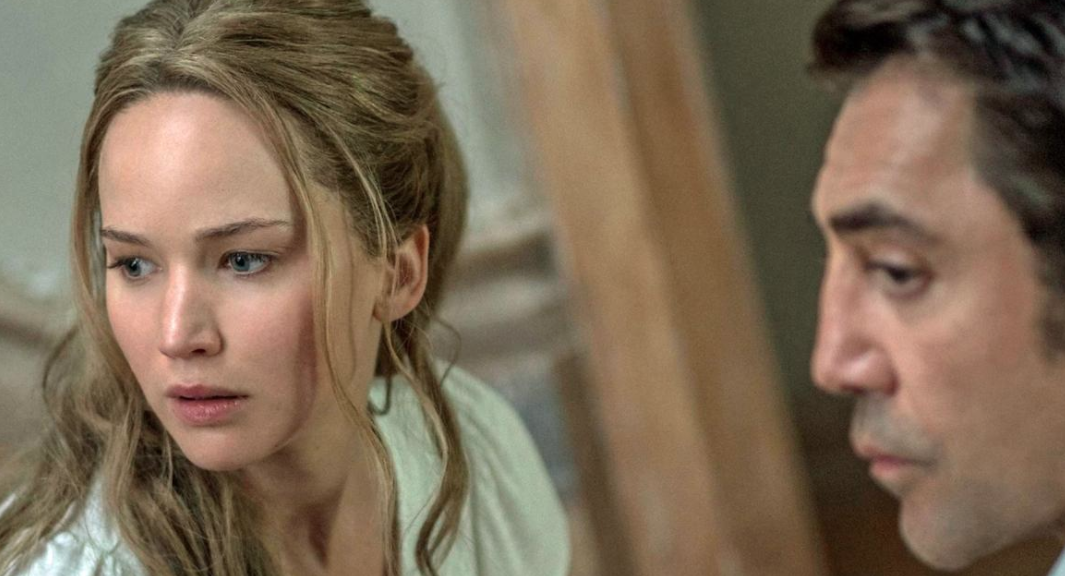WARNING – Very Minor SPOILERS
Mother! exists in a place outside the sphere of reality. Nothing that happens in Darren Aronofsky’s film reflects anything that would actually happen. It is entirely allegory, and when the allegory becomes clear then it becomes very clear. But clarity only arrives during the closing moments of the film. Everything up until that point acts as a series of escalating questions, with no answers, like an infinite ladder. But the lack of possibility is the film’s weakness. For an allegory to be effective, there needs to be a connection to reality.
A woman, never named but described in the credits as ‘Mother’ (Jennifer Lawrence) lives in an isolated house with her husband, Him (Javier Bardem) an acclaimed poet experiencing a bout of severe writer’s block. One night, a strange man (Ed Harris) arrives at their door, claiming that he thought the house was a Bed and Breakfast. Despite Mother’s misgivings, Him invites the man to stay the night. The following day, the man’s wife (Michelle Pfeiffer) joins them, and the newcomers promptly make themselves at home.
For much of the film’s running time, your mind will be coerced into examining Aronofsky’s purpose. Is Mother! about fame and the invasion of privacy that it invites? Is it about people who are forced to be killjoys as a consequence of egotistical acquaintances? Is it about the breakdown of love? Or the pitfalls of living with a selfish auteur? I spent a lot of time trying to decipher what it was all about, but Aronofsky has made a film that is open to interpretation in the worst kind of way, because most interpretations don’t make his film any better. Neither does the ultimate revelation, which positions the film as a sort of anti-Rosemary’s Baby; an interesting concept that it not satisfactorily pursued here. Rosemary’s Baby, for one, was a compelling film, where Mother! is only a smorgasbord of ideas.
Those ideas are laboured. Aronofsky’s filmmaking has always been about as subtle as a sledgehammer. On the one hand, there has been no compromise in Aronofsky’s creative vision for Mother! The film is exactly the film that he intended to make. On the other hand, nothing that Aronofsky wants to convey here is as revolutionary or intriguing as it needs to be, and certainly doesn’t justify the unpleasant experience that Mother! commits its audience to. Movies have an enormous capacity to encourage thought but Mother! doesn’t promote reflection because Aronofsky has already done the thinking for us, and bewilderment isn’t the same as curiosity.
Aronofsky’s purpose with Mother! may be clear and meticulous but Mother! as a film degenerates into a series of violent images that are designed to infuriate and confuse, only making sense with the arrival of information when then film is almost over. When a semblance of clarity arrives, the revelation isn’t powerful or interesting enough to justify Aronofsky’s deliberately upsetting medley that precedes it.
When the film has finished and your mind has time to connect those allegorical dots, Mother! becomes an exercise in gratifying your own intelligence in relation to understanding the source of Aronofsky’s inspiration. It’s a pity that Aronofsky didn’t understand that his allegory, and as a consequence his film, would have been far more impressive had there been some connection to any form of reality. A film this ambitious without purpose is a hollow experience. Aronofksy’s undoubtedly possesses talent, but his ambition is corrupted by his ego. Mother! is an exercise in Aronofsky demonstrating his own mental capacity. There is no sense of engagement with the audience, and as a result, the movie is little more than a concept. Concepts are fine, but concepts in films are better.

